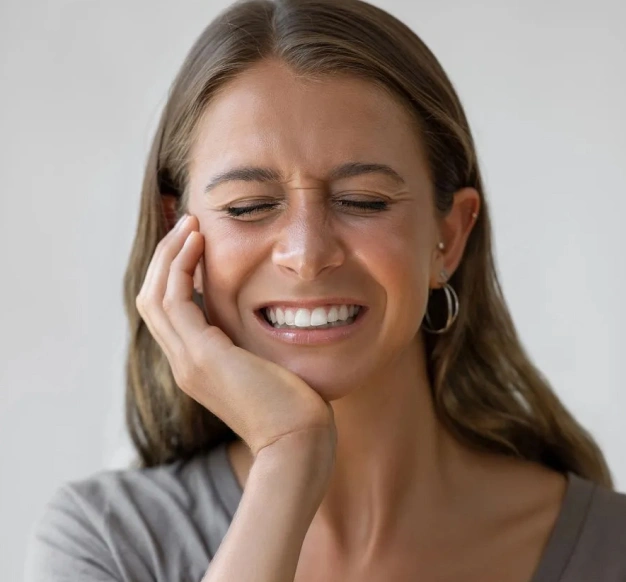Serving East Hanover, NJ

Quick Relief from Headaches and Sore Teeth with NTI
The most common treatment for teeth grinding is a night guard appliance. While night guards protect your teeth from grinding during sleep, they don’t address the underlying clenching action, which means they may not relieve the associated pain. This is where the NTI appliance comes in. The NTI is a tension suppression system designed to stop the clenching action, providing relief from discomfort like headaches and jaw pain.
The NTI works on a simple principle. If you accidentally bite down on something hard with your front teeth, your mouth instinctively opens to avoid damage, thanks to the "Nociceptive Trigeminal Inhibitory" (NTI) reflex. The NTI appliance takes advantage of this reflex with a small, clear acrylic bite guard worn on either the upper or lower front teeth while you sleep. If you start to clench, the guard activates the reflex, stopping the clenching before it causes pain.
The NTI is the only FDA-approved non-surgical solution for preventing and treating migraine headaches. By reducing the intensity of clenching during sleep, the NTI alleviates the source of pain, offering relief from headaches, jaw soreness, and other discomforts. Many patients feel significant relief overnight, while others notice improvements within a month. The time it takes for your muscles to adjust depends on the individual.
Though the NTI appliance is custom-fitted by your dentist, no molds or impressions are required. It can be fitted in under 30 minutes right in the office. Once in place, the NTI snaps securely onto your teeth and can only be removed by hand.
At The Art of Smile Dental Dental Studio, we’ve helped many patients who suffer from headaches, sore jaws, and muscle pain due to clenching. With regular use of your NTI, you can expect to experience less tension and stress, leading to a more comfortable and productive day.
Protect Your Smile with a Custom Night Guard from The Art of Smile Dental!
Millions of people suffer from bruxism, a condition where the upper and lower teeth grind against each other, typically at night, though some may experience it during the day as well. While occasional teeth grinding isn’t a concern, chronic grinding can lead to worn enamel, tooth damage, and other health issues like headaches, sore neck and jaw muscles, and facial joint disorders.
Many people who grind their teeth at night aren’t aware of the damage being done. Often, they only discover the issue when their grinding is loud enough to wake their partner, or when a dentist notices signs of bruxism in their teeth or dental restorations.
Those who smoke or drink alcohol are more likely to grind their teeth, and stress is a major contributing factor. The more stress you experience, the more likely you are to grind your teeth. Many people go through cycles of grinding, particularly during times of stress. Children can also grind their teeth, though they usually outgrow the habit. In some cases, grinding in children can indicate a blocked airway, which may mean the child needs their tonsils and adenoids removed.
To protect your smile and prevent the premature wear and tear caused by grinding, a custom-fit night guard or occlusal appliance is often recommended. These mouthguards are individually crafted to fit your teeth perfectly. Impressions are taken, then sent to a dental lab, where a high-grade material is molded over the model according to your dentist’s specifications.
Although custom-made mouthguards are more expensive due to the materials and time involved, they offer superior comfort and protection, making them the best option. Typically, mouthguards cover the upper teeth, though in some cases, a lower guard may also be recommended. A well-designed mouthguard should be comfortable, durable, tear-resistant, easy to clean, and not interfere with your breathing or speech. To explore your treatment options or schedule an appointment, give us a call today.
Persistent bad breath, or halitosis, affects millions of people. Most often, it’s caused by decomposing food particles in the mouth. In this case, a thorough cleaning and better home oral hygiene practices can resolve the issue.
If poor oral hygiene isn’t the cause, we may perform a saliva test to identify the source of the bad breath. Once we know the cause, we can recommend the appropriate treatment to eliminate the problem. We’re here to help ensure bad breath doesn’t affect your confidence or comfort.

